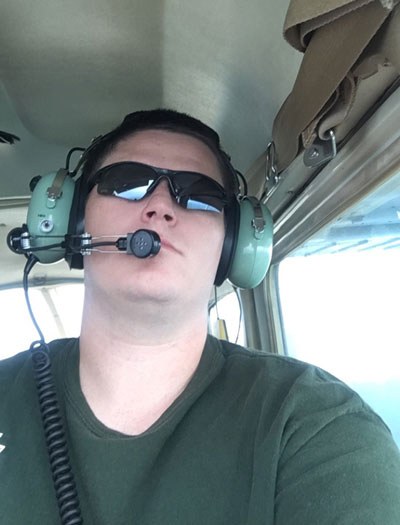Robert Lusk is a forester with PA DCNR, serving as the Southern Area Assistant Forest Health Specialist. He is responsible for conducting field work such as early detection beetle trapping, gypsy moth egg mass surveys, hemlock wooly adelgid population surveys, and other surveys to monitor insect and disease fronts that pose a threat to forest health. He is also involved in the planning, design, and implementation of different treatment activities including stem injections, soil injections, and spraying from rotary and fixed-wing aircraft. He is responsible for aerial survey flights to monitor defoliation and other tree damage that may be occurring in his region (15 counties).

Robert Lusk
Degree Earned
B.S. Forest Science, 2014
Q: What was your educational path to Penn State and to degree completion?
I graduated high school and originally enrolled as a business major and attended Colorado State University in Fort Collins, CO. After deciding that was not the place or major for me, I came to Penn State and took courses at Penn State Altoona for one semester before switching my major to forestry and moving to University Park.
Q: What additional training or education have you completed since earning your baccalaureate degree?
I am currently enrolled in the University of Missouri's M.S. program in Natural Resources with an emphasis on agroforestry, and plan to graduate at the end of July 2016. Additionally, I have taken exams to receive my Certified Public Pesticide Applicator license, as well as numerous federal and state trainings with regards to aerial survey work. Included in these is a "pinch hitter" course where you are trained to fly the single engine survey plane in case of emergency.
Q: What were some of your activities as a student?
I am a Brother at Tau Phi Delta Fraternity, and most of my free time was spent hunting or fishing with other members of the house. In addition I competed on the Penn State Woodsmen's Team for three years and was a member of the Society of American Foresters (SAF).
Q: Was there an activity or course at Penn State that was particularly important to you?
The course that most influenced my career path was PPATH 318, Diseases of Forest and Shade Trees, that was taught by Dr. Davis. I enjoyed learning about the different diseases, insects, and other organisms that affect tree health so much and asked to be a teaching assistant the following year. It was through that experience I learned what aspect of forestry I really wanted to be involved in for my career.
Q: What did you like most about your major?
The field labs were my favorite part of the major. Every semester I had at least one course with a weekly field lab. Breaking up sitting through lectures with field work made college a lot more interesting.
Q: What skills are necessary to do your job well?
In my position the ability to learn new information and the ability to adapt on a day-to-day basis are important. What I am doing may change from day to day or in the course of a day, and new insects, diseases, and potential treatments emerge all the time so you have to be able to keep up with the latest information.
Q: What advice do you have for current students?
Get a summer internship. Your ability to gain skills in the field and reinforce what you learned throughout the year helps a lot. Additionally, developing relationships with employers while you are still in school allows you to build a reputation, with the chance of employment post-graduation.

